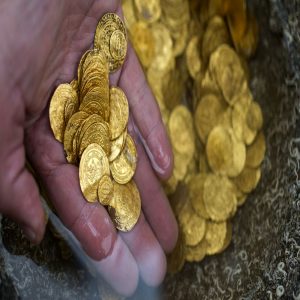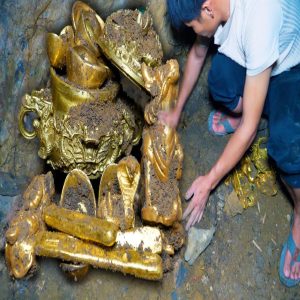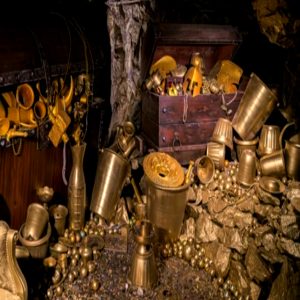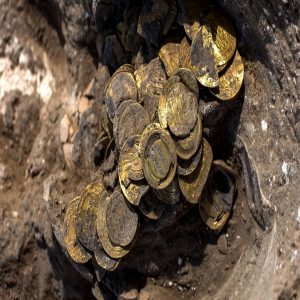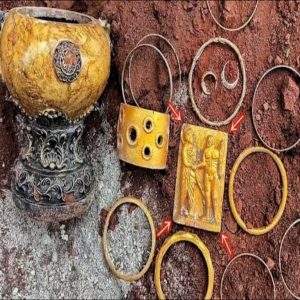Two thousand years ago, warrior queen Boudicca from the Celtic Iceni tribe led an uprising against the occupying forces of the Roman Empire. Her army marched upon a settlement for discharged Roman soldiers in Camulodunum, now modern-day Colchester in England, and the Romans fled, realising they didn’t have the numbers to defend themselves against Boudicca’s enormous force.
It is in this town, buried beneath the floor of what is left of an ancient Roman dwelling, that archaeologists found a stash of golden Roman jewellery hidden in a bag and a wooden box. Was it hastily stashed by a terrified woman as Boudicca’s army descended upon the town? According to The Telegraph, that is the belief of archaeologists who have uncovered what they believe is one of the finest collections of Roman jewellery ever found in Britain.
The collection is composed of a tangled ball of golden armlets, earrings, rings, silver chains, and coins. Dr Philip Crummy, the director of Colchester Archaeological Trust, described the find hidden under the Essex town’s high street as “of national importance and one of the finest ever uncovered in Britain”.

Archaeologists have uncovered one of the finest collections of Roman jewellery near Colchester. Image source.
Dr Crummy added that the discovery is particularly poignant because of its historical context: “Boudicca and her army destroyed London and St Albans but many of the inhabitants had time to escape. However, the people of Colchester were not so fortunate”.
Boudicca, sometimes spelt Boadicea, was Queen of the Iceni people, a British tribe who lived in what is today Norfolk and parts of Suffolk and Cambridgeshire. In 60 AD, Boudicca led a revolt against the Romans, who had taken over her lands and raped her two daughters.
Whilst Gaius Suetonius Paulinus, the Roman Governor led his troops into north Wales, Boudicca, with an army of 100,000 men attacked Camulodunum (Colchester) and burnt it to the ground.

An artist’s impression of Queen Boudicca. Image source.
Dr Crummy explained that the Romans in Camulodunum were “defenceless, with only a small force of soldiers and no town defences… They would have tried desperately to bury and hide valuables like jewellery for safe-keeping.”
The fact that the jewellery was never reclaimed by its owner suggests that she may not have met a happy end. Historical records indicate that the noble women of Colchester were taken to the sacred groves and killed. There is no evidence to indicate that the owner of the jewellery met this fate, but it is one possibility.
Queen Boudicca led the celts to victory on three occasions, when they ransacked and destroyed Colchester, followed by London and St. Albans. But, despite overwhelming numbers, they lost the crucial Battle of Watling Street to the Romans. After the battle, the remaining Iceni dispersed or were captured and taken into slavery.

